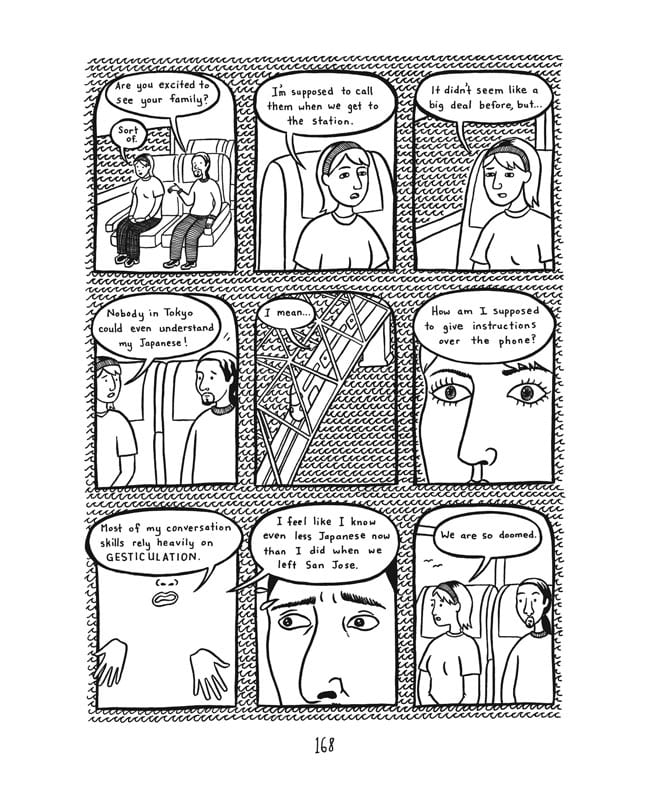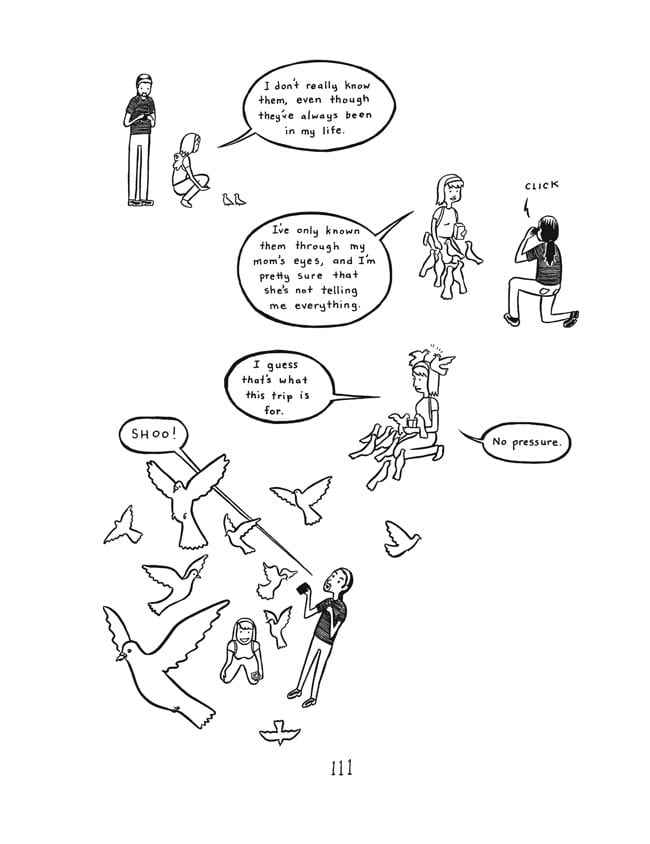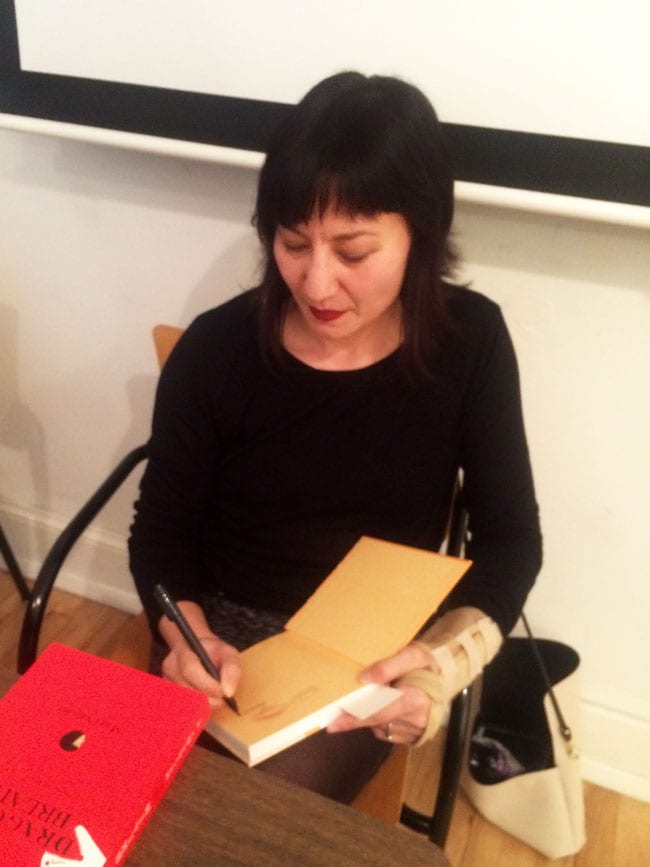
MariNaomi and I have been good pals since we first met at the Alternative Press Expo (APE) back in 2008. At the time, Mari was working on her seven-issue zine series Estrus, the bulk of which was collected into her first book, Kiss & Tell: A Romantic Resume, Ages 0 to 22. She has since published two more books, both with Minneapolis publisher 2dcloud: the Eisner-nominated Dragon's Breath and Other True Stories and her latest, the graphic memoir Turning Japanese. Both are terrific work, showcasing Mari's mastery of the memoir form, rendered in her whimsically minimalist style. Turning Japanese describes Mari's past efforts to connect with her Japanese roots (her mother is Japanese), first by working at a Japanese hostess bar in San Jose in the mid-nineties, and then with a three-month sojourn to Japan, complete with her then-romantic partner, Giuseppe, in tow. Throughout, she captures the challenges of navigating cultural differences and dissonances with keen insight, warmth, honesty, and humor.
Mari recently stayed with me in Minneapolis while powering through the Midwestern portion of her book tour for Turning Japanese. Though a bit tired and nursing a broken left wrist and sprained right hand (due to an unfortunate running accident mere days before the start of the tour), she was in good spirits. The bulk of the interview took place on my back porch on a hot, lazy June afternoon–amidst the loud chirping of cardinals and the rustle of trees we talked about her book, her drawing process, touring, and other interesting things.
Rob Kirby: Strangely enough, it was only with this, your third book, that I actually noticed that you work vignette style: you never tell one long story straight through, it’s always cut up into little standalone chapters that cohere into a larger whole. Is that intentional on your part, or is that simply the way it seems to work for you?
MariNaomi: Well, that’s just how the stories come to me. I actually didn’t think of that either: I thought of Turning Japanese as one long story. Yeah, they are vignettes, but one long story. I had it all planned out, all these little stories. Sometimes they directly connect with each other and sometimes they don’t. But that’s how life is.
But you really didn’t see this as vignettes?
No, not at all! [laughs]
I think the fact that I just noticed this after all this time is a testament to your skill with weaving a solid narrative out of disparate threads. To me, Turning Japanese relates to your first book, Kiss & Tell, as a continuation/extension of that story’s coming-of-age narrative. Do you have any comments on that?
They’re such different books, though chronologically Turning Japanese happened right afterwards. The focus in Kiss & Tell was really more on the boyfriends and girlfriends. I like to think of that book as a character study of me, as reflected through the eyes of my various partners. But in Turning Japanese, Giuseppe is a main character. The story wouldn’t have happened without him—he's integral to the story, the main supporting role. When I was living in Japan with him I suddenly saw where my mom's annoyance with me came from, with me always demanding that she be the Japanese translator for me. Having Giuseppe being the annoying pest that he was, constantly asking, "What does that mean, can you translate, translate?"—that really helped me empathize with my mom. [laughter]
And then there was his obsession with getting those Ultraman DVDs.
Yeah, we happened to be in Japan during the 50th anniversary of Ultraman, so that stuff was just everywhere! So of course his feeling was "This is paradise!" But it was only for that short window of time. And he still rues that he didn't get all that swag he wanted [laughter].
So are you saying you saw your own behaviors and cultural misunderstandings and anxieties reflected in his experience of Japan?
Well, not really… it's more that I never understood why my mom was so put out about translating Japanese for me, until I was in that situation, and I realized it's really hard to switch back and forth; you're not thinking in both languages at the same time. And actually when you're the translator you’re not participating in the conversation, you're mostly a conduit for other people–in a way you're erased from that social situation. But, if Giuseppe hadn't have been there with me I would have certainly had other struggles.
I wanted to talk to you about your drawing style. How intentional is the use of negative space in your panels? For example, there are times when you draw people sitting but you don't draw the chairs–somehow it all makes visual sense, but I imagine you sweat over that sort of drawing. How do you pull that off?
I start by drawing everything. I figure out the scene—who and what was there—and I'll usually draw out the whole scenario. After that I start erasing: "What's not necessary here?" For example, in the third panel of this scene in the car with me, Giuseppe and my grandfather, you just see us and the car and nothing else, no backgrounds, even though you see us looking at stuff. But none of that was relevant to this particular situation. Plus you saw the landscape in the panel above— there's no point in repeating it. It's kind of stylistic, but it's also to show that we're all in our own individual orbits, even though we're physically in the same place:

I think it's a smart approach, emotionally as well as visually: it's really appealing to the eye. But I love these more detailed panels, like the one of your grandparent's house: we want to see that sweep. It's great.

I like this other scene in Noriko's room also: simple and spare, holding all the visual information that the reader needs.

Those are the objects in her place that caught my eye when I walked in. I probably have photo references.
Were you taking pictures the whole time?
Yeah!
Were you always inclined to do so?
No, But when I knew I was going to go to Japan, I was so excited I was finally going to get to travel that I bought something like 30 rolls of film, which was very expensive back then. I took pictures the whole time. Then, when I got back to the states I had no money to develop them! So I got this job at a camera store. So that worked out. [laughter]
I'm always categorizing cartoonists: there's this pure storytelling school that I would put you in, alongside John Porcellino, Kelly Froh, people like that. It's this type of storytelling where the fat is boiled down to a lean, spare-looking narrative. What's called "deceptively simple."
I feel like that describes my process, both with writing and drawing: I'm basically editing the whole time. But I don't want to be spare just to be spare (or busy just to be busy). I want everything to mean something.
To meet the emotion of the scene or the moment?
Exactly. Once I was mentoring a student, who had this wonderful, personal story she wanted to tell about her family. It was a quiet piece, and that's how she was approaching it. But some of her peers, her fellow students, were trying to convince her to draw all these very dramatic panels for it, which was causing her a lot of anxiety, because she didn't think she could pull that off. And the thing is, what they were suggesting was completely wrong for this particular story! I think when you're just starting out you might feel like "I need X, Y, & Z to tell a story," but that's not how it works! There's no template. Every story has its specific needs. That's what I learned from doing all those comics for The Rumpus, which became my book Dragon's Breath. I learned as I went how to make each individual piece be what it wanted to be.
There was a wide variety of tones and even stylistic changes in that book. But you pulled it all off with panache—it's still all of a piece.
There's another panel from Turning Japanese that I wanted to ask you about, here on p.168:

Did you do the pattern of the water here just as decoration, or were you commenting stylistically on the patterns that you and Giuseppe seemed trapped in? I think the pattern is aesthetically appealing while also strengthening this part of the story.
I don't remember if that was the intention, I do know that I put a lot of thought into this page, I fussed over it. "How do I convey this?" I was definitely trying to convey anxiety.
I know you've always identified as an atheist, so this sequence on prayer and spirituality is quite interesting. Younger Mari decides that prayer may not be such a dopey thing after all. What were you praying for here, do you remember? It's a powerful sequence, without being sanctimonious or saccharine.
You know, I don't really remember, but I suppose my version of prayer is sending out good energy—that prayer is expelling energy into the void. Even though I don't believe in Gods I do understand that there is a lot that is unexplained in this world; I've often picked up on weird feelings when I've walked into different places. In this scene I walked into this ancient place where people in often desperate situations have always gone to pray; before I even knew this I felt this sort of gut-punch feeling when I walked in, a spiritual gut-punch. I didn't know what I was feeling but it was profound. Energy is coming from our bodies all the time, and when you're doing anything strenuous emotionally or physically that energy is strong. So, I don't know, maybe what I was feeling was the energy of those prayers. Maybe I was just praying for the demise of my nemeses, I don't know! [laughter]
But you were praying, right? Communing with something? Something… bigger?
No, no. Definitely not. [laughter]
So how do you feel about the book?
2d did such a good job with the production. It's beautiful, the best part of the book.
But how do you feel about the story? Has it been cathartic, getting it all down?
No, I'm kind of past catharsis with my comics—now I just want to tell a good story. When I was in the middle of putting Kiss & Tell together I went from thinking "This is a great way to figure out my own shit!" to "No, I just need for this to be good, a compelling read." When examining your life—especially significant things in your life—it's hard not to come to some realizations about yourself, so I guess there's this automatic catharsis. But that's so not what I'm in this for now.
Even though the book is just out, I drew it years ago. So it's old to me. But I read it recently and think it stands up well, and I'm happy to put it out there in the universe. There are pages I like a lot…
Any in particular?
Here, page 111. I remember fretting over how to bring this to life, but once I started putting pen to paper it just happened. I'm especially proud of that little lightning bolt, I don't know why.

Yeah, isn't it funny how just the most seemingly inconsequential details can bring it all home.
I'm also really happy with the reception it's been getting, I didn't expect this to be as successful as it's been.
What are some of the responses that have been particularly memorable to you?
Well, people who have had similar experiences reaching out to me, that's been great—especially because I wasn't sure anyone would. A number of people, from several different cultural backgrounds, talked with me about trying to learn a new language and how fatiguing that is; and there have been people of mixed race who have related to the stuff dealing with being alienated from your motherland.
Have you heard from many women who have worked at hostess bars?
A few… but I can't really talk about that—there's some delicate and even really awful stuff there. But I will say that having talked to other people that had jobs in this industry that I had a very benign, vanilla experience compared to others.
Ok, we'll stop there then. How has the tour been? I interviewed another cartoonist last year who said after his tour he couldn't bear to drive anymore, and that he'd racked up some debt in the process.
Yeah, it's expensive. I had five people show up in Indianapolis—which was wonderful, as I'd been expecting zero—but the hotel cost $500, so you know….
A gay writer I know once told me that you don't really do book tours to sell books, you do it to for other reasons. Why do you think it's good to do a book tour, if you’re afforded that opportunity?
It's complicated… I'm not at the point in my career anymore where I'm trying everything—you know: "This might work, that might work." I've narrowed it down a little. Now I'm actually not 100% sure what the rewards of a book tour are. But I'm hoping to make connections with booksellers—to charm them, to make them want to carry my books throughout my career. That would be my #1 goal. Also, a new source of income for me is schools inviting me to come speak at their institutions. They'll pay me a stipend and fly me out, that kind of thing. So the more I get out there and meet people, the more likely this can happen. And then of course there's the ego thing: connecting with people who enjoy my work. That can't be monetized. And it can help keep me going when I'm driving with two broken hands for hours and hours by myself, in a car without air conditioning in 90+ degree heat! [laughter]







